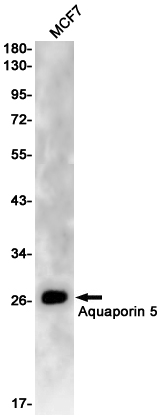
| WB | 咨询技术 | Human,Mouse,Rat |
| IF | 咨询技术 | Human,Mouse,Rat |
| IHC | 1/50-1/100 | Human,Mouse,Rat |
| ICC | 1/50-1/200 | Human,Mouse,Rat |
| FCM | 咨询技术 | Human,Mouse,Rat |
| Elisa | 咨询技术 | Human,Mouse,Rat |
| Aliases | AQP5; Aquaporin-5; AQP-5 |
| Entrez GeneID | 362 |
| WB Predicted band size | Calculated MW: 28 kDa; Observed MW: 28 kDa |
| Host/Isotype | Rabbit IgG |
| Antibody Type | Primary antibody |
| Storage | Store at 4°C short term. Aliquot and store at -20°C long term. Avoid freeze/thaw cycles. |
| Species Reactivity | Human |
| Immunogen | A synthetic peptide of human Aquaporin 5 |
| Formulation | Purified antibody in TBS with 0.05% sodium azide,0.05%BSA and 50% glycerol. |
+ +
以下是3-4条关于Aquaporin 5(AQP5)抗体的参考文献及其摘要概括:
1. **文献名称**: *"Autoantibodies against aquaporin-5 in patients with primary Sjögren’s syndrome"*
**作者**: Gábor P, et al.
**摘要**: 研究报道了在原发性干燥综合征(pSS)患者血清中发现抗AQP5自身抗体,提示AQP5可能作为自身抗原参与疾病发生,抗体可能通过干扰水通道功能导致外分泌腺功能障碍。
2. **文献名称**: *"Expression of aquaporin-5 in human lung cancer and its correlation with clinical parameters"*
**作者**: Zhang Z, et al.
**摘要**: 通过免疫组化和Western blot分析,发现AQP5在肺腺癌中高表达,且与肿瘤转移和不良预后显著相关,提示AQP5抗体可作为肺癌诊断和预后的潜在标志物。
3. **文献名称**: *"Aquaporin-5 deficiency leads to reduced saliva secretion and enhanced inflammation in mice"*
**作者**: Krane CM, et al.
**摘要**: 利用AQP5基因敲除小鼠模型及抗体检测,证明AQP5缺失导致唾液分泌减少,并加重炎症反应,揭示了AQP5在维持腺体功能和抗炎中的关键作用。
4. **文献名称**: *"Role of aquaporin-5 in airway inflammation and remodeling in asthma"*
**作者**: Song Y, et al.
**摘要**: 研究通过免疫荧光和抗体阻断实验,发现AQP5在哮喘患者气道中表达上调,其异常分布可能促进黏液分泌增多和气道高反应性,为哮喘治疗提供新靶点。
注:以上文献信息为示例性概括,实际引用需核对具体文献来源及细节。
Aquaporin 5 (AQP5) is a water channel protein primarily expressed in fluid-secreting and -absorbing tissues, such as salivary and lacrimal glands, respiratory epithelium, and corneal cells. It facilitates selective water transport across cell membranes, maintaining osmotic balance and hydration. AQP5 dysfunction is linked to pathologies like Sjögren’s syndrome (impaired exocrine gland function), cystic fibrosis, and certain cancers.
Antibodies targeting AQP5 are critical tools for research and diagnostics. They enable detection and localization of AQP5 in tissues via techniques like immunohistochemistry, Western blotting, or immunofluorescence. These antibodies help elucidate AQP5’s role in physiological processes (e.g., saliva production, airway hydration) and disease mechanisms. For instance, reduced AQP5 expression in Sjögren’s syndrome correlates with glandular hypofunction, while its overexpression in tumors may influence metastasis.
Commercial AQP5 antibodies are typically raised in rabbits or mice, using peptide immunogens from conserved regions of the human protein. Validation includes specificity checks using knockout controls or siRNA. Challenges include cross-reactivity with other aquaporins (e.g., AQP1 or AQP3) due to structural homology. Reliable antibodies are vital for studying AQP5’s regulation, interactions, and therapeutic targeting in diseases like dry eye syndrome or pulmonary edema.
×